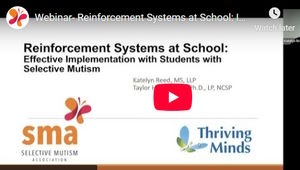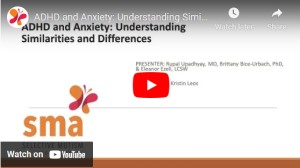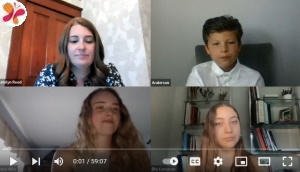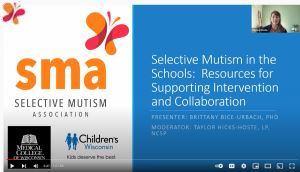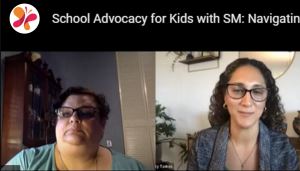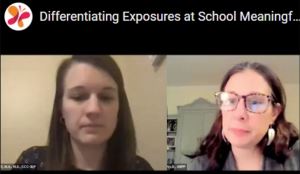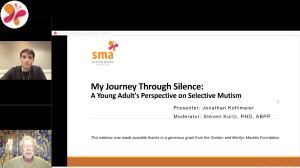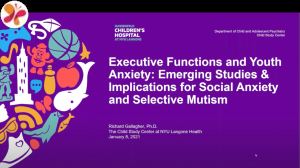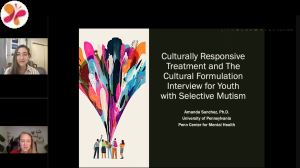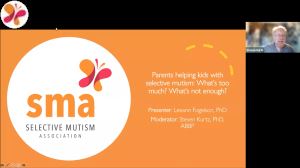Recorded Thursday, November 14, 2024Speakers: Taylor Hicks-Hoste, LP, NCSP & Katelyn Reed, MS, LLPPlease note, CE credit is not available for watching this recording. This webinar is geared toward school… Continue reading Webinar: Reinforcement Systems at School: Effective Implementation with Students with Selective Mutism
Resources Categories: Educators
Webinar ADHD and Anxiety: UnderstandingSimilarities and Differences
Presented by Brittany Bice-Urbach, Ph.D., Eleanor Ezell, LCSW & Rupal Upadhyay, MD, FAAPRecorded: Wednesday, July 17, 2024. This webinar is geared toward parents, treating professionals, educators, and caregivers. This presentation… Continue reading Webinar ADHD and Anxiety: UnderstandingSimilarities and Differences
Hear Our Voices Panel
Moderator: Katelyn Reed, MS, LLP Recorded: June 2, 2022 This webinar is geared toward treating professionals, school professionals, parents, caregivers, and individuals with SM! Join individuals who have overcome Selective… Continue reading Hear Our Voices Panel
Selective Mutism in the Schools: Resources for Supporting Intervention and Collaboration
Presented by Brittany Bice-Urbach, Ph.D. Recorded September 14, 2021 This webinar is geared educators and professionals working in school settings. Parents and treating providers may also find this information valuable… Continue reading Selective Mutism in the Schools: Resources for Supporting Intervention and Collaboration
Webinar: School Advocacy for Kids with Selective Mutism: Navigating 504’s and IEP’s
The majority of children and teens with SM struggle at school and we know that a key aspect of their therapy is getting support in the school environment. Many caregivers feel lost and aren’t given the education in how to approach their school. What do you ask for? How do you ask for it? What are realistic expectations? These are common and valid questions.
Webinar: Differentiating Exposures at School- Meaningful Goals for Each Stage of Your Child’s Journey
Emily Doll and Rachel Busman talk about speaking at school and how parents and teachers can choose the right path based on where the child is at in their speaking goals. The speakers will specifically discuss what strategies to use 1) when the child is not yet verbal at all, 2) when the child is starting to speak, and
Webinar: My Journey Through Silence: A Young Adult’s Perspective on Selective Mutism
Jonathan Kohlmeier was diagnosed with selective mutism at age 5. Through extensive therapy he was able to overcome his SM. At the age of 19 he wrote a book about his experiences called Learning to Play the Game: My Journey Through Silence. From not speaking to a single classmate in kindergarten to eventually being on his high school debate team, Jonathan will talk about his journey and answer questions. Moderating the discussion will be Dr. Steven Kurtz, Jonathan’s own doctor who helped him challenge his SM as a child.
Webinar: What are the Executive Functions and Are They Important in Selective Mutism and Childhood Anxiety Disorders?
The executive functions are seminal components in children’s development and adjustment. When thinking of child and adolescent disorders, most executive function investigations have focused on excessive behaviors such poor attention control, impulsivity, and aggression. However, the executive functions play a role in anxiety disorders as well.
Webinar: Culturally Responsive Treatment and The Cultural Formulation Interview in Youth with Selective Mutism and Anxiety
This webinar will discuss the importance of emphasizing cultural context in our clinical work with youth and families. Then, the cultural formulation interview (CFI) will be described. How to gather culturally relevant information to incorporate into case conceptualization and treatment planning in the context of selective mutism and anxiety will be discussed.
Parents Helping Kids with SM: What’s Too Much? What’s Not Enough?
For loving caregivers, it is challenging to see your child in distress. It can be difficult to grapple with the fact that ‘rescuing’ a child from moments of distress can actually do more harm than good. When we make it too easy for an anxious child with selective mutism not to talk, we inadvertently reinforce their habit of avoidance.
